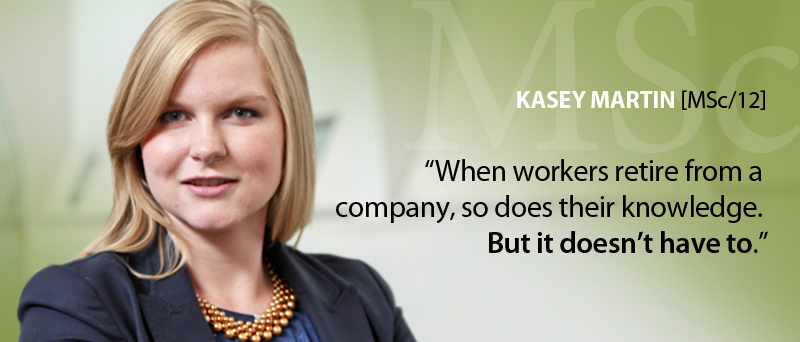
Kasey Martin: The Importance of Sharing Knowledge
When workers retire from a company, so does their knowledge. As a graduate student in the Asper MSc program, Kasey Martin (MSc/12) decided to explore the causes and consequences of this common human resource problem in her research and thesis.
Kasey surveyed hundreds of retiring employees across Canada to find out what conditions led to greater knowledge sharing.
“My research looked at both explicit knowledge about specific tasks and job processes, which can be taught to successors through training, demonstration, or writing – and tacit knowledge, which is gained over time through personal experience, and is therefore much more difficult to identify and share.”
Among other things, Kasey learned that job satisfaction, organizational support and emotional attachment to an organization correlated strongly to how likely a retiree was to share their knowledge “before walking out the door one last time.”
Her research led her to make several recommendations in her graduate thesis for employers hoping to preserve the knowledge of their retirees, including setting up knowledge-sharing policies and practices, and giving employees are greater financial stake in their organization, such as pension plans or stock options.
“I was inspired by my dad,” she says. “When he retired after working 35 years at the same organization, former co-workers and supervisors would call our house at all hours of the day (literally!) to ask him questions. I wondered why they hadn’t thought to ask him to share his knowledge before he retired – even though he gave them three years notice!”
Kasey’s research has paid off in many ways.
In June 2012, she was given a five-year Research Associate appointment at the Asper School. Along with two colleagues, she was awarded a grant from the Workers’ Compensation Board of Manitoba later that year to conduct research on safety knowledge sharing in the workplace – a project that continues to this day.
Her graduate work also opened the door to a career as a learning and development analyst at Alliance Pipeline, in Calgary.
“My favourite project there was launching the company’s first-ever employee engagement survey,” Kasey says. From survey design to implementation and analysis, she played an active role on the project, and worked with senior leadership to devise an action plan to address the strengths and weaknesses uncovered in the results.
“It suited me perfectly. I really enjoy solving problems. I also love to learn – and research is the coolest because you’re always learning!”
In October 2013, Kasey made her next career move – this time into the world of consulting. As an independent consultant (and her own boss), she now works in change management/analytics at Agility Factor Inc., a Calgary consulting firm. Her first project there will be to help a company implement a new resource planning system.
“A large portion of my job will be measuring the impact of change and training on employee morale and learning, respectively, as we implement the new system,” she says.
Kasey attributes much of her success to the critical thinking skills she gained in the Asper MSc program.
“I’m much more capable of thinking critically and holistically about issues,” she says. “I’m also much more confident in my ability to challenge others – and myself – in a positive, constructive manner. Debates and discussions in class got us to think more openly about our research and our personal beliefs. I’m more critical of where I get my information from and how I interpret it – which is essential to the kind of work I do.”






